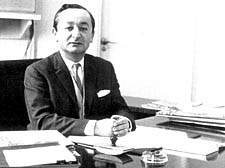|
|
 |
| |

'Father' of Radio 4, Gerald Mansell |
After 40 years, we’re still on Radio 4’s wavelength
Whether ‘a republic of ideas’ or a source of middle-class comfort and reassurance, Radio 4’s history has been entwined with that of the nation, writes Piers Plowright
• LIFE ON AIR: A HISTORY OF RADIO 4.
By David Hendy. Oxford University Press £25. Order this book
REVOLUTION and counter-revolution, baronial struggles, regional discontent, suicides and palace coups, incipient civil-war, violent constitutional change thwarted by a popular uprising – and that’s just the radio.
Broadcaster and academic David Hendy’s account of the birth, growing pains, and increasingly important life of the BBC’s Radio 4 over it’s 40-year history makes engrossing and highly entertaining reading, and you don’t have to be an insider like me to enjoy it.
Born on Saturday, September 30, 1967, its mother was definitely the venerable Home Service, the voice of the nation during the Second World War and the trusted if slightly mocked friend of Middle Britain.
There’s some dispute over the father, but my vote would go to Gerard Mansell, ex-head of the Home, director of programmes, and chief architect of “Broadcasting in the Seventies” which set the pattern for radio over the next 20 years. At a bound we had DJs and pop music (Radio 1), light music and jazz (Radio 2), classical music and “highbrow” talk and drama (Radio 3 taking over, and some would say, watering down, the revered Third Programme) and news, current affairs, and “middlebrow” talk and drama (Radio 4).
What kind of infant was this last and most complicated member of the new family to be?
I suppose when people refer to the BBC as “Auntie” it’s really Radio 4 they mean: reassuring, comfortable, middle-class, slightly improving. And yet, as Hendy abundantly shows, such a character description is a huge oversimplification.
From the beginning there were competing currents, between reflecting society and challenging it, between information and analysis, between describing the world and imagining it.
There were wars within the corporation and outside it, conflicting pressures from government and governors, fiercely fought battles between management, producers and public. And what a public, ready to pounce on the slightest “betrayal”.
“To them,” writes Hendy of the early 1970s listenership, “culture and politics were not matters of ephemeral taste but of eternal standards: any slip by the BBC was not just a fall from the glory days of Reith but easily regarded as an index of the nation’s decline”.
Lord Reith himself was long gone, but his legacy of public service and national duty remained to inspire and infuriate in equal measure. And while Radios 1, 2 and 3 could create, and cater for, their own constituencies, Radio 4 had to try and please everybody. At least that was how it seemed at first.
Luckily, a succession of strong and opinionated controllers, Tony Whitby (visionary), Ian McIntyre (combative), Monica Sims (tactful but firm), David Hatch (adventurous) and Michael Green (an expert at riding whirlwinds) challenged and successfully escaped such impossible blandness.
Monica Sims, whom I remember with great affection and admiration, never a hair out of place, always elegant but with steel running through her, put what Radio 4 had become by the 1980s perfectly: “Surprise, through different perspectives on life through satire, poetry, storytelling, songs, argument, defining ideas, contact with opinion formers, writers, scientists, historians, philosophers and imaginative stimulus through works of art, music, drama, literature.”
In other words, a rich mix, like the one that still draws and surprises listeners in 2007. For alongside the established and respected blockbusters – The Archers, Today, Any Questions, Woman’s Hour (itself, subtly and powerfully changed over the years), The World at One, Analysis, Desert Island Discs and so on – lurk the one-off plays, the montage features, the idiosyncratic talks, the subversive comedy (not enough of that at the moment), and the intellectual challenge of Thursday mornings with In Our Time.
“Disgusted, Tunbridge Wells” still has plenty to get his/her note paper out about and some critics have accused the new freer Radio 4 of being no more than a chaotic ragbag. For most of us, though, it comes close to what a former controller thought it should be: “A Republic of Ideas.”
This is a rich book about a rich subject. Some readers might prefer more anecdotes, more accounts of Beeb eccentricity, a little more scandal. For me, it lives up to its title and Hendy’s last sentence says it all: “For all its imperfections and irritations, it (R4) reaches middle age as the one network broadcasting as a whole cannot do without.”
'You're sending the nation to work far more thoughtful'
Piers Plowright on his memories of Radio Four
|
 |
|
 |
 |
|
 |
|



